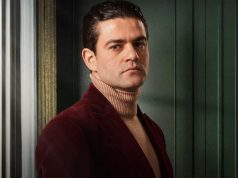 CWM: Tell us about the problems Hatshepsut is facing in the film, and what fans can expect in Part 2.
CWM: Tell us about the problems Hatshepsut is facing in the film, and what fans can expect in Part 2.
Fans can expect to see Hatshepsut facing all her enemies from within the palace and from exterior forces as well. When we left her in Part 1, she had been betrayed by her brother and husband, Thutmose II. In Part 2, we’ll see how she fights both for the love of Senmut and for the love of her country and the people she is ruling over. The main struggle she faces is the dichotomy that exists between power and love. It may seem impossible, but in reality, it is not.
What were the hardest, as well as the best part of playing such an important historical figure?
The difficulty of playing such a prominent figure in Ancient Egyptian history was how this character’s role in history was erased, mainly by her nephew Thutmose III who succeeded her to the throne after she stepped down. We’re not sure exactly why, perhaps because she was a woman and men did not want to keep a trace of a woman ruling Egypt and Sudan. So we don’t have much information to glean from the time of her reign, even the hieroglyphs created during her time on the throne were debased from the main temples and tombs. I had to imagine how this woman could have lived, ruled, and loved – it was a mix between fantasy and history.
The best part was similar, I found Hatshepsut to be a modern woman. Even her temple on the West Bank in Luxor is a unique and modern type of temple. The pillars are different from the rest. She was a beautiful, wise and fair ruler. She was unapologetic in her power, despite the challenges of being a female ruler. She had to wear a beard in public to be seen and accepted as a ruler! So she fought the patriarchal system from within and kept fighting until the end. I believe she ruled with a lot of heart and knew how to use it, which ultimately led her to lose this historical fight for power and be erased from history.
This film has love stories throughout all the ages, what do you think is special about Senmut and Hatshepsut’s love story compared to the rest?
The three different love stories presented in El Kenz all share one commonality; they are all impossible because of power. Each love story includes one person in the relationship who holds a position of power in society that leads the relationship to be impossible. I think Sherif Arafa wanted to discuss how love and power are often at an odds or contradicting, and you often have to choose one or the other.
What makes Senmut and Hatshepsut’s relationship special is how it is real and verified historically. Senmut was her chief architect, her lover, her confidante, and he even raised her daughter and was like a father figure to her. They also chose to be buried next to each other, which is significant. There is a tunnel inside her tomb discovered by archaeologists that connects her tomb to Senmut’s. So, it’s a love story that transcends time, and even transcends mortal life. It goes beyond, into the afterlife.
Tell us about the experience of working with a celebrated director like Sherif Arafa and such a diverse cast.
Working with Sherif Arafa is always a pleasure. As a director, he is always pushing boundaries and trying new things, approaching new topics, and filming his movies is always a challenge. As a director, Sherif knows exactly what he wants and is demanding. However, he also trusts his actors and if he likes someone, he really gives a lot of space and freedom for creativity. I’ve worked with him several times, and consider him both a mentor and a pioneer in Egyptian cinema.
QUICKFIRE ROUND
Last film you watched?
Vice with Christian Bale
Favorite actor/actress?
Many! Daniel Day-Lewis, Meryl Streep, Guillaume Canet, Anthony Hopkins, Ryan Gosling … many!
Favorite food?
Pasta
Favorite designer?
Ralph & Russo and Elie Saab
Last best vacation you took?
Japan during the Cherry Blossom season… unforgettable!
Goal for 2019?
Learn to play chess and go back to playing oud.





